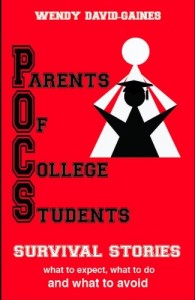I love books because, well, I just love books. They are some of my prized possessions. These college books are part of my collection because they are jam-packed with information about the college admissions process. Some of them are informational, and others help you relax and laugh during the process. Add these books for parents of college-bound students to your reading list. After all, who doesn’t like books?

1. College Bound and Gagged
Nancy takes the everyday aspects of the college admissions process and puts them into terms that parents can easily understand and relate to by using humor. And if that’s not enough, she sprinkles some of the best college admissions advice along the way by tapping into her own personal experiences and her network of college experts that she utilizes throughout the book.

2. POCSMom Survival Stories
Wendy David-Gaines, the author, is famous for exposing the cliches about college. After giving the cliche, she gives you the “POCS reality”. In her book, Wendy does this effectively by compiling actual parent stories. The stories (both from pre-POCS and POCS) are simple, light-hearted, often humorous and an easy read. But here’s the clincher–they provide parents with added insight into each individual situation.

3. How to Win Scholarships
The best part about Monica’s e-book is that it’s simple and easy to understand. If you follow her easy 10 step program, the scholarship process becomes doable for any parent and their student. You can sit back and hope that your student does all the work, or you can offer help and support by grabbing a copy of Monica’s book, reading it, and rolling up your sleeves.

4. Debt Free U
When Zac Bissonnette headed off to college, he had the funds to cover the tab. Bissonnette has seen the currently flawed system first hand. He’s a contrarian, and his book is packed with studies and statistics to back up his analysis. It’s a magical combination that college-bound students and their parents should read, even if there’s plenty of money set aside to pay the tuition tab. There’s no harm in learning ways to get the biggest bang for your buck and the best education available at the same time.

5. Why You’re Already a Leader
The author, Paul Hemphill, forces history to shout its powerful lessons about our least appreciated ability – leadership. A pre-teen, a parent, or a corporate exec doesn’t need to be trained for leadership because it’s already alive and pumping in your DNA. The proof is all here. Here’s the bonus feauture: it uses history as a motivational tool. Instead of stats and facts, you get more than 200 life-lessons from Gettysburg to help you succeed in any endeavor. What’s the number one quality admissions officers look for in a candidate for admission? Leadership!









